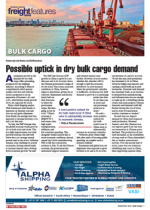Safety and visibility have taken centre stage in the ever-evolving bulk market in recent years. As the industry continues to grow and adapt to changing consumer demands and technological advancements, companies are prioritising these trends to enhance operations, reduce risks, and meet environmental and regulatory requirements.According to Dinesh Balgobind, director of chemical and gases at ICA Bulk Logistics, safety remains a top priority when transporting bulk liquids. “We continuously ensure that all staff are trained, certified and up to date on the various dangerous goods codes.”He said the company had also recently purchased a new international logistics system. “An increasing emphasis is placed on supply chain visibility in bulk cargo operations. With this system, we can now integrate with other service providers within the industry to offer our customers real-time data sharing and accurate updates on their cargo's status, location, and estimated arrival time. Through technological advancements, tank containers can now be fitted with various sensors and telematics, allowing us to monitor and remotely control the state of our customers’ products.”He said inadequate and inefficient transport infrastructure continued to impede bulk cargo f low across roads, railways and ports. Despite this, it was an industry that continued to offer significant opportunities.“With an increased global focus on sustainability, customers can be attracted by adopting environmentally friendly practices in bulk cargo logistics. This includes minimising carbon emissions through optimising transport routes, incorporating renewable energy sources and adopting sustainable packaging and handling practices, such as cryogenic tanks designed to transport oxygen, liquefied natural gas (LNG) and hydrogen.”Balgobind said there was also an opportunity for bespoke solutions. “Tailoring solutions to meet customer needs, addressing risks, streamlining operations and reducing risk is increasingly important. Our outlook for the bulk sector remains positive as the world population increases, leading to higher demand for commodities like food, energy and minerals.”He said this demand supported the growth of bulk cargo transportation. ”Tank containers offer various solutions; besides having the ability to transport products safely across the globe, we have utilised them to provide drinking water to f lood-damaged and water shortage areas, as well as giving customers an option of static storage.”He said the high energy demand, in particular, played a significant role in bulk cargo volumes. This included the need for coal, crude oil, and LNG. “While there is a global shift towards renewable energy, coal and oil remain important energy sources, particularly in African regions. Simultaneously, the rise of LNG as a cleaner-burning fossil fuel has increased LNG transportation globally.”

